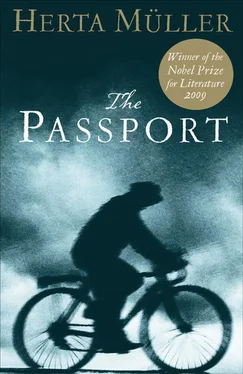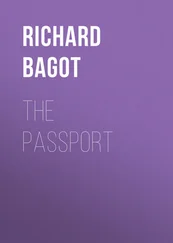Amalie feels the heels of the white sandals in her stomach. The fire from her forehead is burning in her eyes. Amalie’s tongue presses down in her mouth. The silver cross gleams in the window pane. A shadow is hanging in the apple tree. It’s black and disturbed. The shadow is a grave.
Windisch is standing in the door way. “Are you deaf?” he says. He holds the big suitcase out to Amalie. Amalie turns her face to the door. Her cheeks are wet. “I know,” says Windisch, “leave-taking is hard.” He seems very large in the empty room. “It’s just like in the war again,” he says. “We go and we don’t know, if and how and when we’ll come back.”
Amalie fills the tear once again. “It doesn’t get so wet with water from the well,” she says. Windisch’s wife puts the plates into a suitcase. She takes the tear in her hand. Her cheek bones are soft and her lips are damp. “You would hardly believe, that there is such a thing,” she says.
Windisch can feel her voice inside his head. He throws his coat into the suitcase. “I’ve had enough of her,” he shouts, “I don’t want to see her any more.” He lowers his head. And quietly adds: “The only thing she can do is make people sad.”
Windisch’s wife wedges the cutlery between the plates. “Indeed it is,” she says. Windisch sees the slimy finger which she pulled out of her hair. He looks at his passport photo. He rocks his head from side to side. “It’s a difficult step,” he says.
Amalie’s glass shines in her suitcase. The white patches on the walls of the room grow larger. The floor is cold. The light bulb casts long rays into the suitcase.
Windisch puts the passports in his jacket pocket. “Who knows what will become of us?” sighs Windisch’s wife. Windisch looks at the piercing rays of light. Amalie and Windisch’s wife shut the suitcase.
A wooden bicycle creaks in the fence. Above, a bicycle of white cloud swims peacefully in the sky. Around the white clouds the clouds are water. Grey and empty as a pond. Around the pond only silent mountains. Grey mountain ranges heavy with longing for home.
Windisch is carrying two large suitcases, and Windisch’s wife is carrying two large suitcases. Her head is moving too quickly. Her head is too small. The stones of her cheek bones are enclosed in darkness. Windisch’s wife has cut off her plait. Her short hair is permed. Her mouth is hard and narrow from her new teeth. She talks loudly.
Box trees sway in the church garden. A strand loosens from Amalie’s hair. The strand returns to her ear.
The pot hole is cracked and grey. The poplar stands like a broom in the sky.
Jesus sleeps on the cross by the church door. When he wakes up, he’ll be old. The air in the village will be brighter than his naked skin.
At the post office the lock is hanging on its chain. The key is in the postwoman’s house. It opens the lock. It opens the mattress for the hearings.
Amalie is carrying the heavy suitcase with her glass. Her handbag hangs over her shoulder. In it is the box with the tear. In her other hand, Amalie carries the crystal vase with the dancer.
The village is small. People are walking in the side streets. They’re far away. And are drawing further away. The maize is a black wall at the end of the streets.
Windisch sees the grey swathes of time standing still around the station platform. A blanket of milk lies over the rails. It reaches up to their heels. Over the blanket lies a glassy skin. The still time spins a web around the suitcases. It tugs at their arms. Windisch shuffles over the gravel.
The steps of the train are high. Windisch lifts his shoes out of the blanket of milk.
Windisch’s wife wipes the dust from the seats with her handkerchief. Amalie holds the crystal vase on her knees. Windisch presses his face against the window. A picture of the Black Sea hangs on the wall of the compartment. The water stands still. The picture rocks. It’s travelling too.
“I’ll feel sick in the aeroplane,” says Windisch. “I know that from the war.” Windisch’s wife laughs. Her new teeth chatter.
Windisch’s suit is too tight. The sleeves are too short. “The tailor made it too small for you,” says Windisch’s wife. “Such expensive cloth and completely wasted.”
As the train travels on, Windisch feels his forehead slowly filling with sand. His head is heavy. His eyes sink into sleep. His hands tremble. His legs twitch and are awake. Windisch sees an expanse of rusty scrub through the window. “Since the owl took his son, the tailor can’t think anymore,” says Windisch. Windisch’s wife holds her chin in her hand.
Amalie’s head hangs on her shoulder. Her hair covers her cheeks. She’s sleeping. “Let her sleep,” says Windisch’s wife.
“Now that I don’t have my plait anymore, I don’t know how to hold my head.” Her new dress with the white lace collar shines green like water.
The train rattles over the iron bridge. The sea rocks over the wall of the compartment, over the river. There is much sand but little water in the river.
Windisch follows the beating wings of the small birds. They fly in ragged flocks. They’re searching for woods along the river flats, where there are only thickets and sand and water.
The train travels slowly, because the rails criss-cross in confusion, because the town is beginning. Scrap heaps. Small houses stand in overgrown gardens. Windisch sees that many rails run into one another. He sees other trains on the confusion of rails.
The golden cross on the chain hangs over the green dress. There is so much green around the cross.
Windisch’s wife moves her arm. The cross swings on the chain. The train travels quickly. It has found an empty track among the many trains.
Windisch’s wife stands up. Her gaze is fixed and certain. She sees the station. Under her perm, inside her skull, Windisch’s wife has already furnished the new world, into which she is carrying her large suitcase. Her lips are like cold ashes. “God willing, we’ll come back for a visit next summer,” she says.
* * *
The pavement is cracked. The puddles have swallowed the water. Windisch locks the car. A silver circle gleams on the car. Inside it are three spokes like three fingers. There are flies on the bonnet. Bird shit sticks to the windscreen. Behind on the boot, the word Diesel. A horse-drawn waggon rattles by. The horses are bony. The waggon is made of dust. The carter is a stranger. He has large ears under his small hat.
Windisch and Windisch’s wife are walking in a ball of cloth. He’s wearing a grey suit. She has a grey costume of the same cloth.
Windisch’s wife is wearing black shoes with high heels.
In the pot hole Windisch feels the cracks tugging at his shoes. There are blue veins on his wife’s white calves.
Windisch’s wife looks at the sloping red roofs. “It’s as if we never lived here,” she says. She says it as if the sloping roofs were red pebbles under her shoes. A tree lays its shadow over her face. Her cheek bones are stony. The shadow withdraws to the tree. It leaves wrinkles on her chin. Her golden cross gleams. The sun catches it. The sun holds its flames on the cross.
The postwoman is standing by the boxwood hedge. There is a tear in her patent leather bag. The postwoman holds out her cheek for a kiss. Windisch’s wife gives her a bar of Ritter Sport chocolate. The sky-blue paper is shiny. The post-woman lays her fingers on its golden edge.
Windisch’s wife moves the stones in her cheekbones. The night watchman comes towards Windisch. He raises his black hat. Windisch sees his own shirt and his own jacket. The wind drives the shadow of a spot onto Windisch’s wife’s chin. The shadow falls onto the jacket of her costume. Windisch’s wife wears the shadow beside her collar like a dead heart.
Читать дальше












